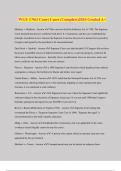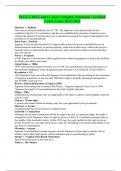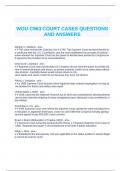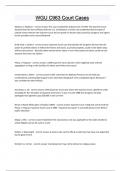Wgu c963 c - Study guides, Class notes & Summaries
Looking for the best study guides, study notes and summaries about Wgu c963 c? On this page you'll find 230 study documents about Wgu c963 c.
Page 4 out of 230 results
Sort by
WGU C963 Court Cases Exam Questions with Complete Solutions Graded A+

-
WGU C963 Court Cases.
- Exam (elaborations) • 5 pages • 2023
- Available in package deal
-
- $12.49
- + learn more
Marbury v. Madison This case involved the Judiciary Act of 1789. The Supreme Court declared that the law conflicted with the U.S. Constitution, and the case established the principle of judicial review wherein the Supreme Court has the power to declare laws passed by Congress and signed by the president to be unconstitutional. Dred Scott v. Sanford Supreme Court case that decided US Congress did not have the power to prohibit slavery in federal territories and slaves, as private propert...
WGU C963 COURT CASES QUESTIONS AND ANSWERS

-
WGU C963 Court Cases (Complete)2024 Graded A+
- Exam (elaborations) • 4 pages • 2024
-
- $10.49
- + learn more
WGU C963 Court Cases (Complete)2024 Graded A+ Marbury v. Madison - Answer ️️ -This case involved the Judiciary Act of 1789. The Supreme Court declared that the law conflicted with the U.S. Constitution, and the case established the principle of judicial review wherein the Supreme Court has the power to declare laws passed by Congress and signed by the president to be unconstitutional. Dred Scott v. Sanford - Answer ️️ -Supreme Court case that decided US Congress did not have the po...

-
WGU C963 Court Cases Latest Exam with Complete Solutions
- Exam (elaborations) • 4 pages • 2023
- Available in package deal
-
- $10.49
- + learn more
This case involved the Judiciary Act of 1789. The Supreme Court declared that the law conflicted with the U.S. Constitution, and the case established the principle of judicial review wherein the Supreme Court has the power to declare laws passed by Congress and signed by the president to be unconstitutional. - ANSWER-Marbury v. Madison Supreme Court case that decided US Congress did not have the power to prohibit slavery in federal territories and slaves, as private property, could not be tak...
WGU C963 Court Cases Complete Solutions Verified Court Cases Latest Update.
WGU C963 Court Cases Complete Solutions Verified Court Cases Latest Update.
WGU C963 Court Cases Questions and answers latest update 2024
WGU C963 Court Cases Exam Questions GRADED A+

-
WGU C963 Court Cases Complete Solutions | Verified Court Cases 2022/2023
- Exam (elaborations) • 3 pages • 2024
-
- $9.98
- + learn more
WGU C963 Court Cases Complete Solutions | Verified Court Cases 2022/2023 Marbury v. Madison This case involved the Judiciary Act of 1789. The Supreme Court declared that the law conflicted with the U.S. Constitution, and the case established the principle of judicial review wherein the Supreme Court has the power to declare laws passed by Congress and signed by the president to be unconstitutional. Dred Scott v. Sanford Supreme Court case that decided US Congress did not have the power to ...

How did he do that? By selling his study resources on Stuvia. Try it yourself! Discover all about earning on Stuvia








